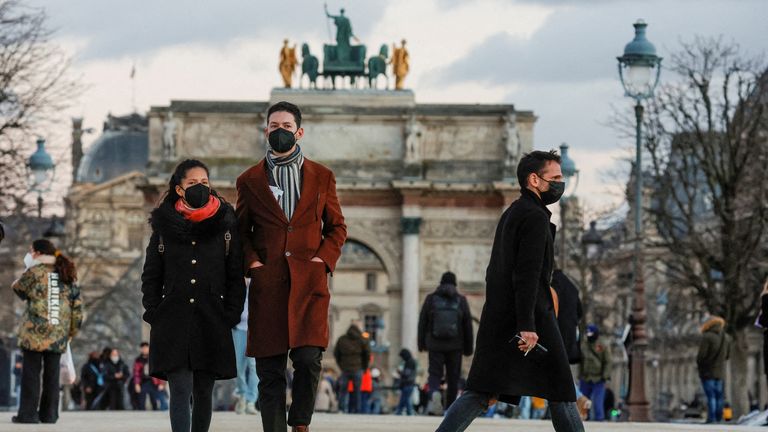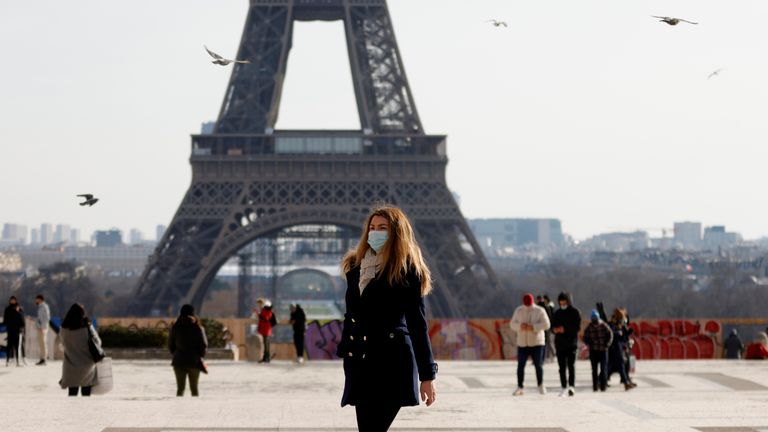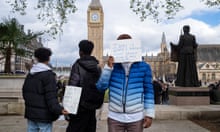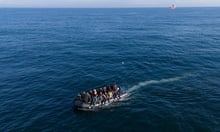Brexit: travel rules between the UK and France
Inspiration

Reading time: 0 min Published on 11 January 2023, updated on 23 April 2024
On 1 January 2021 Brexit came into effect, re-establishing the borders between the UK and France. Here's the information you need to know before planning trips between the two countries.
Please consult our dedicated Covid-19 article for the latest updates on travel between the UK and France.
Following a transition period, Brexit came into effect on 1 January 2021 and the UK left the European Union. Free movement no longer applies between the UK and France, and migration controls have been re-established to and from the UK.

Travel arrangements
For British travellers to France:
Since 1 January 2021, British nationals have been subject to more in-depth checks when travelling. They are encouraged to allow additional time for border control and use the queue labelled 'Ressortissant de pays tiers' rather than 'EU / EEA / CH'.
British nationals who are not resident in an EU Member State and who wish to travel to France for a short stay (a maximum of 90 days in a 180-day period), or who are in transit to another Member State or to the Schengen area, do not require a visa.
Travellers need to:
- present their passport with at least six months' validity, which will be stamped upon entering and leaving the Schengen area. The maximum duration of a short stay cannot exceed 90 days within a period of 180 days;
- be able to prove that they have sufficient funds to meet their needs during their stay. With some exceptions, the minimum required in France is calculated as 65 euros per day. Examples of proof include cash or a bank statement;
- obtain travel insurance covering all medical, hospital and death expenses that could be incurred during their stay in France, including repatriation costs for medical reasons. Current EHIC cards will still be valid until their expiry date.
The supporting documents used to verify compliance with the entry conditions are listed in Annex I of the Schengen Borders Code, accessible here .
Further information on travel arrangements for British nationals to France is available on the French government website here and the UK government website here .
For international tourists wishing to visit both France and the UK on the same trip:
EU, EEA and Swiss citizens can travel to the UK visa-free for holidays or short stays. A passport valid for the duration of the stay is required to enter UK territory. Until 1 October 2021, it is also possible to travel with a valid national ID card.
For nationals from outside the EU, a visa may be required to stay in the UK. Further information is available on the UK government website here .
Travellers from the UK to France are subject to customs control to comply with deductibles for purchases made in the UK, in quantity for alcohol and tobacco, and in value for other goods. The level of these exemptions is specified on the French Directorate General of Customs and Excise website here .
Purchases made in France may be eligible for tax relief - check here . PABLO machines, which automate this process, are available in ports, airports and train stations serving the UK.
Further information on customs procedures for UK travellers to France is available on the French government website here and the UK government website here .
Download the Brexit guide for travellers (French only)
Driving licences
British nationals travelling to France for a short stay can drive under their UK driving licence. An international driving licence is not required.
Travelling with pets
It is no longer possible to enter an EU territory with a European pet passport issued in the UK. British nationals travelling to France with dogs or cats must comply with the following health conditions defined by the regulation of 12 June 2013: - ensure that pets are identifiable by way of a microchip or clearly legible tattoo made before 3 July 2011; - ensure that pets have been vaccinated against rabies and that the vaccine is still valid; - ensure that each pet has a health certificate issued by a registered UK vet. The certificate must be accompanied by proof of vaccination against rabies as well as a document attesting to the pet's ID. Certificates are valid for a period of 10 days from the date of issue and must be presented during border checks during this period. They remain valid in EU territories and Northern Ireland for a period of four months.
EU or Northern Irish nationals returning from a temporary stay in the UK and transporting dogs or cats to France must be in possession of a European pet passport. The passport must certify a valid anti-rabies vaccination and must be presented at border control.
On arrival in France, travellers with pets will need to enter through a designated travellers’ point of entry (TPE).

By Rédaction France.fr
The magazine of the destination unravels an unexpected France that revisits tradition and cultivates creativity. A France far beyond what you can imagine…
Coronavirus Info: the situation in France

Holidays at Galeries Lafayette

Air France, the best and most comfortable way to get to France

French Wine Tasting with Duclot La Cave

Gift vouchers for your shopping at Galeries Lafayette

The Christmas Windows Display and Characters

A Fairy Tale 1, 2, 3 Christmas!

8 Luxurious Boutiques in Paris

France eases COVID travel restrictions for people arriving from UK
This move is a major boost for cross-Channel transport operators and winter sports travel firms - with the French government having imposed a ban on British tourists in December last year to control the spread of the Omicron variant.

News reporter @TomGillespie1
Thursday 13 January 2022 13:08, UK

People travelling from the UK to France will no longer have to self-isolate on arrival or show proof that their trip is essential from Friday morning, tourism minister Jean-Baptiste Lemoyne has announced.
However, the requirement for a negative COVID test, conducted 24 hours before their visit, remains in place.
Those who provide a negative result will also need to be fully-vaccinated.
The move is a major boost for cross-Channel transport operators and winter sports travel firms, particularly as it comes ahead of the vital February half-term period.
Live COVID updates as Van-Tam explains departure in statement
Brittany Ferries chief executive Christophe Mathieu described the announcement as a "great relief" and expressed hope that "we have seen the last border closure of the COVID crisis".
He said: "We've all suffered enormously over the last two years.
More on Covid

Dad who suffered brain injury days after getting COVID vaccine sues AstraZeneca

Finley Boden: Ten-month-old murdered by parents 'should have been one of most protected children', review finds

Routine COVID tests for hospital patients discharged into care homes to be ended by government
Related Topics:
- Coronavirus
"Healthcare professionals are exhausted and businesses in the travel sector have struggled to survive.
"Thousands of Brittany Ferries passengers have been disrupted and millions of pounds in income has been lost as a consequence of draconian measures like border closures."
Abby Penlington, director at industry body Discover Ferries, said: "France is one of the most popular holiday destinations for Brits and traditionally January is a critical month for travel operators as people start to book summer holidays.
"While the ferry industry has continued to operate essential services across the Channel while the border remained closed, we're confident that its reopening will provide a much-needed uplift in bookings."

The travel restrictions are being eased as COVID cases remain high in France - where 361,719 new infections, 246 new deaths, and 16 new admissions to intensive care units were confirmed on Wednesday.
France introduced a ban on non-essential travel to and from the UK on 18 December last year in an effort to slow the spread of the Omicron variant.
People entering the country from Britain had to have "compelling reasons" - with those reasons not including tourism and business.
Those people allowed to enter France from the UK had to have a negative test within 24 hours of their departure.
They also had to isolate for 48 hours after arrival before taking another test.
Read more from Sky News: Heathrow demands all COVID testing is dropped Top holiday destinations revealed
The UK eased its own travel restrictions on Friday last week .
Those who are fully vaccinated no longer need a test before arriving in the UK and they can take a lateral flow test - rather than a PCR - after their arrival.
The move sparked a leap in interest for holiday bookings .
Related Topics
- Go to the main menu
- Go to the mobile menu
- Go to main content
- Press Room Press Room

- Increase text size
- Decrease text size
- Add our RSS feed
Communiqué - Relaxing of conditions for entering and leaving French territory for travel outside the European area (11 March 2021)
- Share on Twitter
- Share on Facebook
- Partager sur Linkedin
Five weeks after the introduction of a requirement for compelling reasons to travel outside the European area, these rules have been amended to take account of international developments in the epidemic and add a number of emergency situations which constitute compelling reasons.
In a decree to be published on Friday 12 March, it will no longer be necessary to have a compelling reason to travel to or from Australia, Israel, Japan, New Zealand, Singapore, South Korea or the United Kingdom due to the very wide dissemination of the British variant in France and the specific health situation in those countries.
For travel to and from those countries, other restrictions on movement remain in force: among other things, it is of course still necessary to present a negative PCR test result less than 72 hours before departure. You are particularly advised to check the travel advice website and strongly advised to limit international travel as much as possible.
Secondly, the list of compelling, personal reasons has been extended to include all family relationships and add new situations linked to family separation for:
- married couples and couples in civil partnerships (PACS), where one member lives abroad for professional reasons;
- minors attending school in France whose family home is abroad;
- separated couples with children, one of the couple living in France and the other abroad.
Students taking competitive examinations are also added to the list, as are those returning to their main residence when it is in France. Templates for the exceptional international travel declarations will be updated accordingly.
Update April 12, 2024
Information for u.s. citizens in the middle east.
- Travel Advisories |
- Contact Us |
- MyTravelGov |
Find U.S. Embassies & Consulates
Travel.state.gov, congressional liaison, special issuance agency, u.s. passports, international travel, intercountry adoption, international parental child abduction, records and authentications, popular links, travel advisories, mytravelgov, stay connected, legal resources, legal information, info for u.s. law enforcement, replace or certify documents.
Before You Go
Learn About Your Destination
While Abroad
Emergencies
Share this page:
Travel Advisory July 26, 2023
France - level 2: exercise increased caution.
Reissued with obsolete COVID-19 page links removed.
Exercise increased caution in France due to terrorism and civil unrest .
Country Summary: Terrorist groups continue plotting possible attacks in France. Terrorists may attack with little or no warning, targeting tourist locations, transportation hubs, markets/shopping malls, local government facilities, hotels, clubs, restaurants, places of worship, parks, major sporting and cultural events, educational institutions, airports, and other public areas.
Incidents such as pickpocketing and phone snatchings occur frequently and can happen anywhere, especially in crowded areas such as airports, train stations, subway and train cars, and near tourist attractions.
Peaceful demonstrations and strikes in Paris and other cities throughout France occur regularly and can disrupt transportation. On rare occasions, demonstrations have included violence and property damage and police have responded with water cannons and tear gas.
Read the country information page for additional information on travel to France.
If you decide to travel to France:
- Be aware of your surroundings when traveling to tourist locations and large crowded public venues.
- Avoid demonstrations and areas with significant police activity.
- Follow the instructions of local authorities including movement restrictions related to any ongoing police action.
- Find a safe location and shelter in place if unable to leave the vicinity of a demonstration.
- Monitor local media for breaking events and adjust your plans based on new information.
- Enroll in the Smart Traveler Enrollment Program ( STEP ) to receive Alerts and make it easier to locate you in an emergency.
- Follow the Department of State on Facebook and Twitter .
- Review the Country Security Report for France.
- Visit the CDC page for the latest Travel Health Information related to your travel.
- Prepare a contingency plan for emergency situations. Review the Traveler’s Checklist .
Embassy Messages
View Alerts and Messages Archive
Quick Facts
At least three months beyond date of departure from the Schengen area. The 12-page U.S. emergency passport is not valid for visa-free entry into France.
Must have at least one blank page for stamps
Not required for stays under 90 days
10,000 Euros Max
Embassies and Consulates
U.S. Embassy Paris 2 Avenue Gabriel 75008 Paris, France Telephone: +(33)(1) 43-12-22-22 Emergency After-Hours Telephone: +(33)(1) 43-12-22-22, enter zero “0” after the automated greeting Fax: +(33)(1) 42-61-61-40 (Special Consular Services) [email protected]
Only the consular sections in Paris and Marseille are authorized to issue passports. The other offices provide limited services to U.S. citizens.
U.S. Consulate General Marseille Place Varian Fry 13286 Marseille Cedex 6 France Telephone: +(33)(1) 43-12-47-54 Emergency After-Hours Telephone: +(33)(1) 43-12-22-22 [email protected]
U.S. Consulate General Strasbourg 15, Avenue d'Alsace 67082 Strasbourg Cedex France Telephone: +(33)(1) 43-12-48-80 Emergency After-Hours Telephone: +(33)(1) 43-12-22-22 Fax: (33)(3) 88-24-06-95 [email protected]
When calling from within France, drop the country code and add a zero. For example: +(33)(1) 43-12-22-22 becomes 01-43-12-22-22.
Please note that the emergency after-hours telephone number for all U.S. posts in France is: +(33)(1) 43-12-22-22 . Ask to speak to the duty officer if you need emergency assistance after business hours.
Destination Description
Learn about the U.S. relationship to countries around the world.

Entry, Exit and Visa Requirements
Visit the Embassy of France website for the most current visa and entry requirement information.
The Government of France does not recognize the 12-page U.S. emergency passport, issued by U.S. embassies and consulates overseas, as a valid travel document for visa-free entry into France. If traveling on this emergency passport, you may be refused boarding and/or entry by immigration officials and/or held at the airport until a return flight to the U.S. is available. Direct transit through France for another destination accepting an emergency passport may be permitted. You should check entry requirements of any other country of destination to make sure the emergency passport is accepted for entry.
You may enter the Schengen area, including France, for up to 90 days for tourist and business purposes without a visa.
Immigration officers may also request you show sufficient funds for your intended stay and a return airline ticket.
If you are traveling to France or Monaco for reasons other than business or tourism, such as employment (including diplomatic or official travel), study, or internship, you must obtain the appropriate French or Monegasque (Monaco) visa for that purpose before you leave the United States. You should be aware that it is nearly impossible to obtain or change visa status while in France.
All minors (under age 18) traveling without a parent or legal guardian and who are residents in France must have the written consent of at least one parent or legal guardian to leave France. The minor must travel with his or her own I.D., a copy of the parent/guardian’s I.D., and form number 15646*01, executed by the parent/guardian and available here .
If you are transiting through France to South Africa, there are special requirements for minors. See Entry, Exit and Visa Requirements for South Africa for additional information.
Contact the French Embassy in Washington at 4101 Reservoir Road NW, Washington, DC 20007, tel. (202) 944 6000, or one of the French Consulates General in Atlanta, Boston, Chicago, Houston, Los Angeles, Miami, New Orleans, New York, or San Francisco for the most current visa information.
Special Note: Overseas departments and territories of France (i.e. those not located in Europe) are not included in the Schengen Agreement. Please see Country Specific Information on French Guiana , French Polynesia , and the French West Indies for entry and exit requirements. For other departments and territories, visit the Embassy of France website for the most current visa and entry requirement information for those areas.
Monaco: For further information on entry requirements to Monaco, travelers may contact the Embassy of the Principality of Monaco , 888 17th Street NW, Suite 500, Washington D.C. 20006, Tel: (202) 234-1530, Email: [email protected] ; or the Consulate General of Monaco, 565 Fifth Avenue – 23rd floor, New York, NY 10017, Tel: (212) 286-0500, Email: [email protected] .
Traveling Through Europe : If you are planning to visit or travel through European countries, you should be familiar with the requirements of the Schengen Agreement.
- Your passport should be valid for at least three months beyond the period of stay if you plan on transiting a Schengen country. Please review our U.S. Travelers in Europe page. We recommend that your passport have at least six months’ validity remaining.
- You will need s ufficient proof of funds and a return plane ticket .
- For additional information about visas for the Schengen area, see the Schengen Visa page.
HIV/AIDS Restrictions: The U.S. Department of State is unaware of any HIV/AIDS entry restrictions for visitors to or foreign residents of France.
Find information about dual nationality , prevention of international child abduction and customs regulations on our websites.
Safety and Security
Terrorism: Terrorist groups and those inspired by such organizations are intent on attacking U.S. citizens abroad. Terrorists are increasingly using less sophisticated methods of attack – including knives, firearms, and vehicles – to more effectively target crowds. Frequently, their aim is unprotected or vulnerable targets, such as:
- High-profile public events (sporting contests, political rallies, demonstrations, holiday events, celebratory gatherings, etc.)
- Hotels, clubs, and restaurants frequented by tourists
- Places of worship
- Shopping malls and markets
- Public transportation systems (including subways, buses, trains, and scheduled commercial flights)
For more information, see our Terrorism page.
French authorities have spoken publicly about the heightened threat conditions for terrorist attacks in Europe.
A counterterrorism law enacted in 2017 allows the government to prevent the circulation of individuals and to create zones of protection and security.
The French government has temporarily reestablished border controls at its borders with its Schengen neighbors and movement may be restricted in some areas. Border controls with the United Kingdom, including the Channel Tunnel crossing, have also been reestablished following Brexit.
The Government of France routinely conducts security and crisis management drills involving deployment of security forces, emergency services, and police to high profile areas that may be near popular tourist sites. U.S. citizens should be aware of the possibility of drills and should heed instructions of local authorities should they encounter them.
French police and military routinely patrol public spaces. You should expect security inspections (to include purses, bags, and backpacks) at the entrance to large public venues and businesses.
When traveling or living in France, you should:
- Be aware of your local security situation and take appropriate steps to bolster your personal security.
- Monitor media and local information sources like France24 , Radio France International , The Local , and the Paris Travel Information webpage and factor updated information into personal travel plans and activities.
- Address specific safety concerns to French law enforcement authorities who have responsibility for the safety and security of all residents and visitors to France.
- Enroll in the Smart Traveler Enrollment Program ( STEP ) to receive Alerts and make it easier to locate you in an emergency.
Crime: The majority of crimes directed against foreign visitors, including U.S. citizens, involve pick-pocketing (passports, phones, cash, credit cards), vehicle and residential break-ins, bicycle theft, and other forms of theft.
Visitors to congested and popular tourist areas (e.g., museums, monuments, train stations, airports, and subways) should be particularly attentive to their surroundings. Rental cars are frequently targeted for break-ins when visitors exit their vehicles and leave valuables behind.
Crimes of opportunity are more likely to involve violence on the street late at night or when the victim resists.
Exercise extra caution when out alone at night and/or consider traveling out at night with trusted companions.
While the incidence of sexual assault is statistically low, attacks do occur.
Be aware of “date-rape” drugs, which are present in France. The Embassy has assisted multiple victims who appear to have been targeted using these drugs.
Be cautious in bars and clubs where alcohol is served, and do not leave your drink unattended or accept a drink from strangers, as they may have slipped drugs into the drink.
There are high incidences of “smash and grab” robberies in economically depressed areas or on highly traveled thoroughfares such as roads to and from the airport. Thieves on foot or motorcycle will approach a vehicle that is stopped in traffic, smash a window, reach into the vehicle to grab a purse or other valuable item, and then flee. Keep doors locked and valuables out of sight.
See our travel tips for Women Travelers .
Demonstrations occur frequently. They may take place in response to political or economic issues, on politically significant holidays, and during international events.
- Demonstrations can be unpredictable, avoid areas around protests and demonstrations.
- Past demonstrations have turned violent.
- Check local media for updates and traffic advisories.
- Strikes can interfere with travel plans and increase expenses of traveling to France.
Demonstration organizers must obtain prior police approval, and police routinely oversee participants. In case of violence or property damage, French authorities may use chemical agents and water cannons to disperse crowds.
Alerts issued regarding demonstrations are posted on the U.S. Mission’s website .
International Financial Scams: See the Department of State and the FBI pages for information.
Victims of Crime: Report crimes to the local police by dialing 112 (the European emergency number which has some English-speaking staff) or 17 from a landline or cell phone and contact the U.S. Embassy Paris at +(33)(1) 43-12-22-22. French authorities do not generally speak English and communication may be difficult. Remember that local authorities are responsible for investigating and prosecuting crime.
See our webpage on help for U.S. victims of crime overseas .
- help you find appropriate medical care
- assist you in reporting a crime to the police
- contact relatives or friends with your written consent
- provide general information regarding the victim’s role during the local investigation and following its conclusion
- provide a list of local attorneys
- provide information on victim’s compensation programs in the U.S.
- provide the Paris Police Prefecture pamphlet in English
- provide an emergency loan for repatriation to the United States and/or limited medical support in cases of destitution
- help you find accommodation and arrange flights home
- replace a stolen or lost passport .
- provide you with information regarding victims’ assistance groups in France
Domestic Violence: U.S. citizen victims of domestic violence are encouraged to contact the Embassy for assistance.
Tourism: The tourism industry is generally regulated and rules with regard to best practices and safety inspections are regularly enforced. Hazardous areas/activities are identified with appropriate signage and professional staff is typically on hand in support of organized activities. In the event of an injury, appropriate medical treatment is widely available throughout the country. Outside of a major metropolitan center, it may take more time for first responders and medical professionals to stabilize a patient and provide life-saving assistance. U.S. citizens are encouraged to purchase medical evacuation insurance .
Local Laws & Special Circumstances
Criminal Penalties: You are subject to local laws. If you violate local laws, even unknowingly, you may be expelled, arrested, or imprisoned. Individuals establishing a business or practicing a profession that requires additional permits or licensing should seek information from the competent local authorities, prior to practicing or operating a business.
Furthermore, some laws are also prosecutable in the U.S., regardless of local law. For examples, see our website on crimes against minors abroad and the Department of Justice website.
Arrest Notification: If you are arrested or detained, ask police or prison officials to notify the U.S. Embassy immediately. French authorities will not routinely notify the Embassy unless you request them to do so. See our webpage for further information.
Penalties for possessing, using, or trafficking in illegal drugs in France are severe.
Convicted offenders can expect long jail sentences and heavy fines.
In France and Monaco, driving under the influence of drugs or alcohol could land you immediately in jail.
Flying Drones: The use of drones and drone footage in France is highly regulated. It is against the law in France to operate drones over public spaces (including museums, parks, streets) in urban areas and near airports, military bases, prisons, nuclear plants, and large gatherings such as outdoor concerts and parades. The privacy of individuals captured in drone footage is paramount. Violators can be arrested and subject to fines of up to 75,000 euros and/or one-year imprisonment. Review the information sheet provided by the French government concerning hobbyist drone flights.
You should contact the Embassy of France or one of France's consulates in the United States for specific information regarding customs requirements. Please see our Customs Information .
There are strict regulations concerning temporary importation or exportation from France of items such as firearms, antiquities, medications, business equipment, merchandise samples, and other items.
French Foreign Legion: U.S. citizens interested in joining the French Foreign Legion (FFL) should be aware that the cognitive and physical tests for acceptance are extremely challenging.
Ensure you have access to sufficient funds to return home should your candidature be refused.
Successful candidates report that the FFL provides a new identity and retains their U.S. passport during a long probation period. Lack of access to your passport can complicate routine or emergency travel.
Faith-Based Travelers: See our following webpages for details:
Faith-Based Travel Information
International Religious Freedom Report – see country reports
Human Rights Report – see country reports
Hajj Fact Sheet for Travelers
Best Practices for Volunteering Abroad
LGBTI Travelers: There are no legal restrictions on same-sex sexual relations or the organization of LGBTQI+ events in France.
See our LGBTQI+ travel information page and section 6 of the Department of State's Human Rights report for further details.
Travelers with Disabilities: The law in France prohibits discrimination against persons with physical, sensory, intellectual or mental disabilities, and the law is enforced. Social acceptance of persons with disabilities in public is as prevalent as in the United States. Expect accessibility to be limited in public transportation and general infrastructure.
Visitors to France should expect accessibility to be limited in public transportation (subway, specifically), lodging, communication/information, and general infrastructure. Getting around French cities can be challenging for those with mobility issues. Many sidewalks are narrow and uneven, and cobblestone streets make access difficult, though major tourist sites generally have better facilities.
Although the Paris Metro is a very efficient method for traveling throughout central Paris, most stations are not readily accessible for people with disabilities. However, many Parisian buses and tramways are equipped with lowering platforms for travelers with limited-mobility, or sight- or hearing-disabled. Taxis are also a good mode of transportation.
The English-language Paris Visitors Bureau and Explore France websites contains additional information specifically designed for travelers with special mobility needs. For further information, e-mail U.S. Embassy Paris , U.S. Consulate General Marseille , or U.S. Consulate General Strasbourg .
Students: See our Students Abroad page and FBI travel tips .
Women Travelers: See our travel tips for Women Travelers .
Dial 15 to connect to emergency medical services or dial 112 to reach an operator.
Ambulance services are widely available, though English is not widely spoken.
Medical care is comparable to that found in the United States.
Except for emergency services, you may be required to pay for service prior to receiving treatment in France. Be sure to obtain a “Feuille de Soins” for later reimbursement from your health care provider.
You may be refused routine care under local law if you lack the ability to pay.
Foreigners with terminal illnesses may be denied treatment if treatment is available in their home country.
We do not pay medical bills. Be aware that U.S. Medicare/Medicaid does not apply overseas. Most hospitals and doctors overseas do not accept U.S. health insurance. Hospital bills are not itemized.
Medical Insurance: Make sure your health insurance plan provides coverage overseas. Most care providers overseas only accept cash payments. See our webpage for more information on insurance coverage overseas. Visit the U.S. Centers for Disease Control and Prevention for more information on the type of insurance you should consider before you travel overseas.
We strongly recommend supplemental insurance to cover medical evacuation.
Always carry your prescription medication in original packaging with your doctor’s prescription. Check with the government of France to ensure the medication is legal in France.
Vaccinations: Be up-to-date on all vaccinations recommended by the U.S. Centers for Disease Control and Prevention.
Further health information:
- World Health Organization
- U.S. Centers for Disease Control and Prevention (CDC)
Air Quality: Visit AirNow Department of State for information on air quality at U.S. Embassies and Consulates.
The U.S. Embassy maintains a list of doctors and hospitals . We do not endorse or recommend any specific medical provider or clinic.
Travel and Transportation
Road Conditions and Safety: Roads are generally comparable to those in the United States, but traffic engineering and driving habits pose special dangers.
Lane markings and sign placements may not be clear. Drivers should be prepared to make last-minute maneuvers.
Right-of-way rules differ from those in the United States. Unless specifically indicated otherwise, drivers entering intersections from the right have priority over those on the left, even when entering relatively large boulevards from small side streets.
Bicycles, motorcycles, scooters, and electric skateboards are prevalent on streets, crosswalks and sometimes sidewalks. They have legal priority and often do not respect traffic signals.
On major highways, there are service stations at least every 25 miles. Service stations are not as common on secondary roads in France as they are in the United States.
Highway toll stations may not accept U.S. credit cards. For non-residents, the simplest way to pay is with cash euros at the toll lane marked for that purpose. Do not attempt to use a credit card if it is the only one you have in your possession in case the machine does not return your card.
Traffic Laws: While French cities actively encourage bicycle rentals through widely available city-sponsored systems, you should be cautious, especially in a busy and unfamiliar urban environment. Helmets are neither required nor readily available near rental stations. If you plan to ride a bicycle in France, you should bring your own helmet. Though bicycles, scooters and electric skateboards must follow local traffic laws, or risk fines, they often do not do so and can pose a danger to drivers and pedestrians. Many paths are clearly marked for this form of transportation in larger cities.
Pedestrian accidents occur when a pedestrian steps out into the street, often when a car or motorcycle is making a turn through a pedestrian crosswalk. Pedestrians should be cautious and aware of traffic even when they have a green walking signal since this is no guarantee against aggressive drivers. Do not assume cars will stop for pedestrians in a crosswalk.
Public Transportation: Paris has an extensive and efficient public transportation system. The interconnecting system of buses, subways, and commuter rails is comparable to or better than that found in major U.S. cities. Similar transportation systems are found in all major French cities.
If you use any of France’s public transportation services, take particular care to retain your used or “validated” ticket until you exit the bus, subway, or train station completely, as it may be checked or required for exit. Children over four years of age must have a ticket.
Inspectors conduct intermittent, random checks and passengers who fail to present the correct validated ticket are subject to stiff and immediate fines. Failing to sign and date or enclose photo (when required) on a tourist pass (Paris Visite) makes the pass invalid and the holder subject to a fine.
Inspectors may show no interest in explanations and no sympathy for an honest mistake. Failure to cooperate with inspectors may result in arrest.
Between cities, France has extensive rail service, which is safe and reliable. High-speed rail connects the major cities in France. Many cities are also served by frequent air service. Traveling by train is safer than driving.
See our road safety page for more information. Visit the website of the French National Tourist Office for specific information on French driver's permits, vehicle inspection, road tax, and mandatory insurance. See Embassy of France’s driving in France webpage for information on using U.S. driver’s licenses in France.
Aviation Safety Oversight: The U.S. Federal Aviation Administration (FAA) has assessed the government of France’s Civil Aviation Authority as being in compliance with International Civil Aviation Organization (ICAO) aviation safety standards for oversight of France’s air carrier operations. Further information may be found on the FAA’s safety assessment page .
Maritime Travel: Mariners planning travel to France should also check for U.S. maritime advisories and alerts . Information may also be posted to the U.S. Coast Guard homeport website , and the NGA broadcast warnings website (select “broadcast warnings.”)
For additional travel information
- Enroll in the Smart Traveler Enrollment Program (STEP) to receive security messages and make it easier to locate you in an emergency.
- Call us in Washington, D.C. at 1-888-407-4747 (toll-free in the United States and Canada) or 1-202-501-4444 (from all other countries) from 8:00 a.m. to 8:00 p.m., Eastern Standard Time, Monday through Friday (except U.S. federal holidays).
- See the State Department’s travel website for the Worldwide Caution and Travel Advisories .
- Follow us on Twitter and Facebook .
- See traveling safely abroad for useful travel tips.
- Summer Olympics in Paris
Review information about International Parental Child Abduction in France . For additional IPCA-related information, please see the International Child Abduction Prevention and Return Act ( ICAPRA ) report.
Travel Advisory Levels
Assistance for u.s. citizens, learn about your destination, enroll in step.

Subscribe to get up-to-date safety and security information and help us reach you in an emergency abroad.
Recommended Web Browsers: Microsoft Edge or Google Chrome.
Check passport expiration dates carefully for all travelers! Children’s passports are issued for 5 years, adult passports for 10 years.
Afghanistan
Antigua and Barbuda
Bonaire, Sint Eustatius, and Saba
Bosnia and Herzegovina
British Virgin Islands
Burkina Faso
Burma (Myanmar)
Cayman Islands
Central African Republic
Cote d Ivoire
Curaçao
Czech Republic
Democratic Republic of the Congo
Dominican Republic
El Salvador
Equatorial Guinea
Eswatini (Swaziland)
Falkland Islands
France (includes Monaco)
French Guiana
French Polynesia
French West Indies
Guadeloupe, Martinique, Saint Martin, and Saint Barthélemy (French West Indies)
Guinea-Bissau
Isle of Man
Israel, The West Bank and Gaza
Liechtenstein
Marshall Islands
Netherlands
New Caledonia
New Zealand
North Korea (Democratic People's Republic of Korea)
Papua New Guinea
Philippines
Republic of North Macedonia
Republic of the Congo
Saint Kitts and Nevis
Saint Lucia
Saint Vincent and the Grenadines
Sao Tome and Principe
Saudi Arabia
Sierra Leone
Sint Maarten
Solomon Islands
South Africa
South Korea
South Sudan
Switzerland
The Bahamas
Timor-Leste
Trinidad and Tobago
Turkmenistan
Turks and Caicos Islands
United Arab Emirates
United Kingdom
Vatican City (Holy See)
External Link
You are about to leave travel.state.gov for an external website that is not maintained by the U.S. Department of State.
Links to external websites are provided as a convenience and should not be construed as an endorsement by the U.S. Department of State of the views or products contained therein. If you wish to remain on travel.state.gov, click the "cancel" message.
You are about to visit:
- International edition
- Australia edition
- Europe edition

Ireland plans to send asylum seekers back to UK under emergency law
Taoiseach wants to reduce arrivals through Northern Ireland amid concern that Sunak’s Rwanda plan is driving people to Ireland
Ireland and Britain are on a collision course over asylum seekers, with Dublin vowing to send arrivals to Ireland back to the UK and London insisting it will not accept any.
A diplomatic row erupted on Sunday after the taoiseach, Simon Harris, asked the justice minister, Helen McEntee, to bring proposals to cabinet next week to allow the return of inadmissible international protection applicants to the UK, amid concern that Rishi Sunak’s Rwanda plan was rerouting asylum seekers from Britain.
“This country will not in any way, shape or form provide a loophole for anybody else’s migration challenges,” Harris said on Sunday. “Other countries can decide how they wish to advance migration. From an Irish perspective, we intend to have a firm rules-based system where rules are in place, where rules are in force, where rules are seen to be enforced.”
The planned legislation follows a claim by Sunak that the Conservative party’s deterrence was working, and after it emerged that 80% of recent asylum seekers to Ireland came via the land border with Northern Ireland.
A UK government source said it would not accept any asylum seekers from Ireland without a wider deal with Brussels. “We won’t accept any asylum returns from the EU via Ireland until the EU accepts that we can send them back to France. We are fully focused on operationalising our Rwanda scheme and will continue working with the French to stop the boats from crossing the channel.”
Ireland had previously designated the UK a “safe third country” to which asylum seekers could be returned but last month the Irish high court ruled that this breached EU law, impeding further returns.
McEntee said she would shore up Ireland’s controls and discuss the return of refugees with James Cleverly and other British officials during a visit to London on Monday.
“That’s why I’m introducing fast processing, that’s why I’ll have emergency legislation at cabinet this week to make sure that we can effectively return people to the UK and that’s why I’ll be meeting with the home secretary to raise these issues on Monday,” she told RTÉ.
In an interview with Sky News on Sunday, Sunak said the Rwanda legislation signed into law last week was already having an impact because people were worried about coming to the UK.
“Illegal migration is a global challenge, which is why you’re seeing multiple countries talk about doing third-country partnerships, looking at novel ways to solve this problem, and I believe will follow where the UK has led.”
Last week, a protest in County Wicklow over proposed refugee accommodation led to violent clashes with police who used shields and sprays and arrested six people. Police said rocks and other missiles were thrown and they recovered an axe.
after newsletter promotion
There have been protests and arson attacks on proposed refugee accommodation centres and demonstrations outside ministers’ homes, fuelling anxiety over far-right agitation.
At a speech in County Monaghan the taoiseach said warning signs around the abuse of public figures should be taken seriously. “We have had too many warnings and we need to take them seriously before the unthinkable happens.”
Ireland has taken in more than 100,000 refugees, about three-quarters from Ukraine. There is an acute housing crisis that has driven up rents and homelessness and fuelled anti-immigrant sentiment. A riot last November wrecked parts of central Dublin.
- Immigration and asylum
- Northern Ireland
- Rishi Sunak
- Simon Harris

London protesters block transfer of asylum seekers to Bibby Stockholm

‘Compassion for the most vulnerable’: bishop thanks protesters who blocked asylum coaches

Father of girl who died in Channel says family feared being deported to Iraq

Lone children at risk of deportation to Rwanda after being classified as adults, says charity

UK will not accept return of asylum seekers from Ireland, Rishi Sunak says

Home Office to detain asylum seekers across UK in shock Rwanda operation

UK Rwanda policy is ‘kneejerk reaction’ to migration, says Ireland’s deputy PM

UK minister appears to mix up Rwanda and Congo on Question Time

What is the real story behind Vietnamese Channel boat crossings?

Macron criticises Rwanda-style asylum schemes days after UK passes bill
Most viewed.
Cookies on GOV.UK
We use some essential cookies to make this website work.
We’d like to set additional cookies to understand how you use GOV.UK, remember your settings and improve government services.
We also use cookies set by other sites to help us deliver content from their services.
You have accepted additional cookies. You can change your cookie settings at any time.
You have rejected additional cookies. You can change your cookie settings at any time.
- Visas and immigration
- Travelling to the UK
Entering the UK
Your identity document (for example your passport or identity card) will be checked when you arrive at a UK port or airport to make sure you’re allowed to come into the country. It should be valid for the whole of your stay.
You may also need a visa to come into or travel through the UK , depending on your nationality.
Check which documents you’ll need to come to the UK .
You do not need to take any Coronavirus (COVID-19) tests or fill in a passenger locator form. This applies whether you are fully vaccinated or not.
What you can bring with you
What you can bring with you depends on where you’re travelling from. You must declare to customs:
- anything over your duty-free allowance
- banned or restricted goods in the UK
- goods that you plan to sell
- more than €10,000 (or its equivalent) in cash, if you’re coming from outside the EU
You and your baggage may be checked for anything you must declare.
Related content
Is this page useful.
- Yes this page is useful
- No this page is not useful
Help us improve GOV.UK
Don’t include personal or financial information like your National Insurance number or credit card details.
To help us improve GOV.UK, we’d like to know more about your visit today. We’ll send you a link to a feedback form. It will take only 2 minutes to fill in. Don’t worry we won’t send you spam or share your email address with anyone.

IMAGES
VIDEO
COMMENTS
1 May 2024. Latest update: Removal of information on disruption to flights across France on 25 April ('Warnings and insurance' page). The Foreign, Commonwealth & Development Office (FCDO) provides ...
New rules have come into force for people entering France from the UK as the French government tries to slow the spread of the Omicron variant. Travellers need an essential reason for their trip ...
13 January 2022. Reuters. France will relax its restrictions for those travelling from the UK from Friday, the government has announced. Vaccinated travellers will no longer need a compelling ...
THE MINISTER - French people going to Britain and returning [to France] - we set the rules for this. Indeed, Britain is an "amber" country, like most of the world's countries - the United States, for example. This means you can come to France from Britain; if you've been vaccinated, you still do a test, because it isn't a ...
For more details about travelling in France, go to the UK Foreign Office travel advice. Return to UK Everyone aged 12 and over travelling to the UK must fill in an online passenger locator form ...
The end of the Brexit transition period on January 1st 2021 ushered in a host of changes to travel between France and the UK. But because of the pandemic, many people have not travelled since then.
The French government has made it clear its statement on Thursday that the new rules apply to both vaccinated and unvaccinated travellers. The UK is still officially classed as an orange country ...
Announcing the move, the Department for Transport said: "People currently in France … are encouraged to follow the local rules and check the FCO travel advice pages on GOV.UK for further ...
For international tourists wishing to visit both France and the UK on the same trip: EU, EEA and Swiss citizens can travel to the UK visa-free for holidays or short stays. A passport valid for the duration of the stay is required to enter UK territory. Until 1 October 2021, it is also possible to travel with a valid national ID card.
The travel restrictions are being eased as COVID cases remain high in France - where 361,719 new infections, 246 new deaths, and 16 new admissions to intensive care units were confirmed on ...
BBC News. Fully vaccinated people can now visit France without quarantining on their return to the UK, after travel rule changes came into force at 04:00 BST. Brittany Ferries said it had received ...
Your Covid-19 questions answered. French people who are living abroad, travelling or returning from abroad, as well as visitors from abroad, will find answers below to frequently asked questions on COVID-19 measures. This FAQ supplements the information on the Conseils aux voyageurs (Travel advice, in French only) section.
The French government has introduced strict limits on travel between France and the UK, which came into effect on Saturday, December 18th. Only those with an essential reason for making their ...
Foreign travel advice. Get advice about travelling abroad, including the latest information on coronavirus, safety and security, entry requirements and travel warnings. Search for a country or ...
In a decree to be published on Friday 12 March, it will no longer be necessary to have a compelling reason to travel to or from Australia, Israel, Japan, New Zealand, Singapore, South Korea or the United Kingdom due to the very wide dissemination of the British variant in France and the specific health situation in those countries.
Call us in Washington, D.C. at 1-888-407-4747 (toll-free in the United States and Canada) or 1-202-501-4444 (from all other countries) from 8:00 a.m. to 8:00 p.m., Eastern Standard Time, Monday through Friday (except U.S. federal holidays). See the State Department's travel website for the Worldwide Caution and Travel Advisories.
To be able to travel in Île-de-France on public transport at peak hours (from 06h30 to 09h30 and from 16h00 to 19h00) you will need to complete a travel certificate to certify your reason for travel.
Future parents will wonder why we left it so late to ban smartphones The risks to children of social media need to be taken seriously. If only on this, France's President Macron is on the right ...
Ireland and Britain are on a collision course over asylum seekers, with Dublin vowing to send arrivals to Ireland back to the UK and London insisting it will not accept any.. A diplomatic row ...
It should be valid for the whole of your stay. You may also need a visa to come into or travel through the UK, depending on your nationality. Check which documents you'll need to come to the UK ...